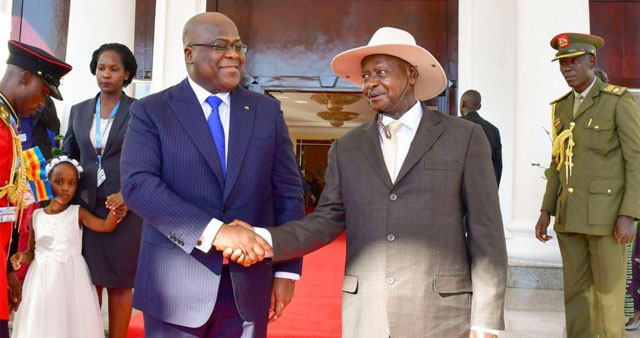
Kampala, Uganda | THE INDEPENDENT | Uganda has argued that the Democratic of Congo (DRC) is simply demanding too much money in compensation and has not presented evidence justifying its claim.
In his opening remarks on Thursday at The Hague—Netherlands—based International Court of Justice (ICJ), Uganda Attorney General William Byaruhanga argued that Congo has simply been demanding too much in war reparations and looting of its minerals by Uganda soldiers during the 1997 to 2003 war.
At one point, in 2012, Byaruhanga said Congo was asking for $23 billion (about 83 trillion Uganda shilling at the current exchange rate) which it has reduced to $13.5 billion (about 48 trillion Uganda shilling) during negotiations. And as per international practices, he argued “compensation must neither exceed payment capacity of the responsible state nor deprive them means of substance.”
Paying the amount DRC is demanding, he said would mean that about twice Uganda’s annual consolidated fund expenditure is transferred to reparation payments.
The ICJ on Tuesday reopened the proceedings of the 2005 case Uganda lost to Congo after the two countries failed to agree on compensation figure. Uganda, Rwanda and Burundi soldiers helped DRC’s late President Laurent Kabila ascend to power in 1997, overthrowing dictator Mobutu Sese Seko Kuku Ngbendu Wa Za Banga.
As Kabila settled in office, he disagreed with the foreign forces that helped him capture power.
Consequentially, he asked them to leave. When Uganda and Rwanda declined to withdraw, Kabila sued them at the ICJ for alleged invasion. Uganda argued that its military’s presence and activities in DRC were, for the most part, based on an invitation and were authorized by the Congolese administration.
When Uganda lost the case in 2005, DRC’s lawyers argued for a reparation figure of US$10 billion which was awarded. However, the court asked the two parties to get together and come up with a figure that is agreeable to both because Uganda protested the claims.
Unclear is when and how Congo ended claiming $23 billion which it has not reduced to $13.5 billion as per Byaruhanga’s presentation.
But the thrust of submissions by lawyers representing Uganda is: Congo has not provided any evidence to deserve compensation.
Sean Murphy, a Professor of International Law at George Washington University Law School, representing Uganda argued that DRC based its compensation claim on broad observations made by the court in 2005 when it ruled that Uganda armed forces violated human right law which caused harm to persons and property as well as a broad conclusion that there was the exploitation of DRC’s natural resources.
“Counsel for DRC neglected to acknowledge that such broad finding did not address any specific incident that had occurred and that the court expected the DRC to prove at this phase of proceedings its specific loss and damage of injury,” Murphy said.
The argument made by DRC on Tuesday that evidence could not be gathered in the context of an armed conflict, Murphy said should be rejected.
“That assertion about the inability to gather evidence relating to war is demonstrably untrue. Iraq’s invasion and occupation of Kuwait did not prevent victims or their families from identifying to the UN compensation commission the names of those who died.”
DRC, Murphy argued must prove the exact injury it suffered, for instance, exact details of persons who died as a result of the war and properties which were destroyed as a result of activities by Uganda soldiers.
Murphy also says that DRC documents don’t have names, death certificates or medical records for those killed or injured. Uganda is also requesting precise records of properties that were destroyed during the war.
*******
URN
 The Independent Uganda: You get the Truth we Pay the Price
The Independent Uganda: You get the Truth we Pay the Price



